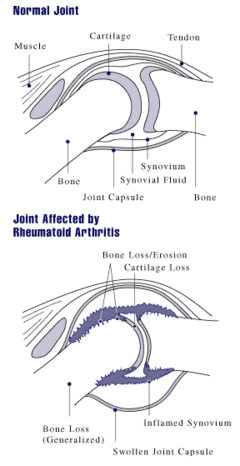Pharmacological Management of Rheumatoid Arthritis
Introduction[edit | edit source]
Rheumatoid arthritis (RA) is a chronic, autoimmune disease marked by systemic inflammation of both articular joints and extra-articular areas (e.g. cardiopulmonary systems). See links for more information on RA
Physical therapy plays a significant role in managing Rheumatoid arthritis (RA). Physical therapists (PTs) should have a good understanding of the disease's pathophysiology and the implications of therapeutic interventions used to prevent or slow down its progression. This knowledge is crucial to provide proper care to patients.
Types of Drug Therapies[edit | edit source]
Recently, there have been incredible expansions in the management of RA due to an increasing number of available drug options This brief video gives an overview of drug options
There are two primary sub-classifications of drugs used in the treatment of RA;
- Drugs that provide disease-modifying therapy (DMARDs) DMARDs are medications taken regularly for longer periods independent of acute symptoms. DMARDs consist of Traditional DMARDs (DMARDs) and Biological DMARDs (bDMARDs).
- Drugs for symptomatic treatment. DMARDs are medications taken regularly for longer periods independent of acute symptoms. Symptomatic therapy is used to relieve acute pain and inflammation associated with the disease process. Non-steroidal anti-inflammatory drugs (NSAIDs), acetaminophen, and corticosteroids are the primary drugs of choice for symptomatic therapy.[2]
Drug Classes
Summary[edit | edit source]
Rheumatoid Arthritis is a complex and constantly evolving disease that requires intricate treatment options. The treatment plan depends on various factors such as the severity of the disease, the location of the injury, comorbidities or contraindications, the cost of the drug, and the need for monotherapy or a combination of drugs.[3] The physical therapist should monitor patients for signs of injury based on their drug categories.
In the initial stages of Rheumatoid Arthritis (RA), NSAIDs and corticosteroids are recommended for short-term and symptomatic pain relief. While NSAIDs have minimal side effects, they may cause gastrointestinal bleeding, cardiovascular problems, and dizziness. It is important to monitor any signs or symptoms that may present while taking these medications.[3][4][5] Corticosteroids are also used in the initial stage as a means of reducing disease activity in patients who are awaiting a response to DMARD therapy.[6] Typical adverse effects of corticosteroids include immunosuppression, which often leads to infection, the development of osteoporosis, and other metabolic conditions.[7]
DMARDs and bDMARDs are similar in that they can adversely affect the GI system, pulmonary function, and blood pressure, and cause skin irritation.[6]
Although these effects may be seemingly minor in comparison to more malignant conditions, the PT should monitor and report these symptoms as appropriate. Many of these medications may cause the patient to become frail in stature, so the PT must exercise caution during the therapy session. In addition, patient education is a significant component of care and the clinician is responsible for providing relevant treatment while remaining within the physical therapy scope of practice.
References[edit | edit source]
- ↑ Mayo Clinic Drugs for RA Available from: https://www.youtube.com/watch?v=8vu6aNmAano&feature=youtu.be (last accessed 29.12.2019)
- ↑ Singh JA, Saag KG, Bridges SL, et al. 2015 American College of Rheumatology Guideline for the Treatment of Rheumatoid Arthritis. Arthritis & Rheumatology 2016;68(1):1-26.
- ↑ 3.0 3.1 McNeil. FDA:Motrin (ibuprofen suspension, oral drops, chewable tablets, caplets) prescribing information. Physicians’ desk Ref [Internet]. 2007;56:2002–5. Available from:https://www.accessdata.fda.gov/drugsatfda_docs/label/2007/017463s105lbl.pdf
- ↑ Novartis. ( diclofenac sodium enteric-coated tablets ) WARNING : RISK OF SERIOUS CARDIOVASCULAR AND GASTROINTESTINAL. 2016; Available from: https://www.accessdata.fda.gov/drugsatfda_docs/label/2016/019201s046lbl.pdf
- ↑ U.S. Food and Drug Administration. CELEBREX ® celecoxib capsules Cardiovascular Risk • C. 2016;1–31. Available from: https://www.accessdata.fda.gov/drugsatfda_docs/label/2008/020998s026lbl.pdf
- ↑ 6.0 6.1 Kumar P, Banik S. Pharmacotherapy Options in Rheumatoid Arthritis. Clinical Medicine Insights: Arthritis and Musculoskeletal Disorders. 2013 Jan;6:CMAMD.S5558.
- ↑ Bingham, C. John Hopkins University. Rheumatoid arthritis treatment. Available from: https://www.hopkinsarthritis.org/arthritis-info/rheumatoid-arthritis/ra-treatment/. Accessed October 3, 2018.







